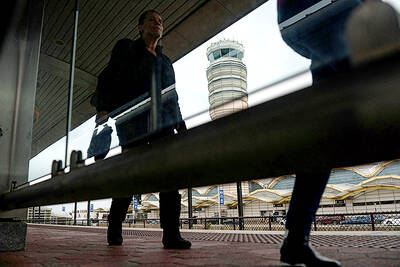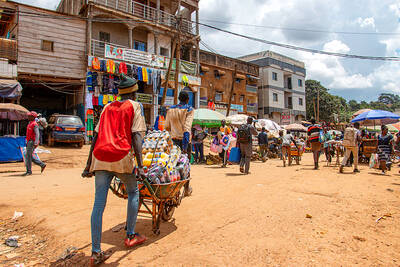Sitting in his university office in Macau, professor Lei Heong Iok (李向玉) opens what he calls his “treasure” — a dog-eared Portuguese-language dictionary, its velvet cover worn and frayed.
Lei’s decades-long love for the language has turned him into a campaigner for its survival in the former Portuguese colony.
Learning Portuguese fell out of fashion in Macau after it was handed back to China in 1999, becoming a semi-autonomous territory loyal to Beijing and growing into the world’s biggest gambling destination.
Although Portuguese remained an official language and street signage is still bilingual, many in the predominantly Cantonese-speaking territory switched their study focus to Mandarin.
However, Portuguese is back in vogue as China forges business ties with lusophone nations such as Brazil, Angola and Mozambique, and casts Macau as a key link because of its cultural ties and history.
Students in the territory see studying Portuguese as a shrewd career move.
Lei — who was born in China, learned Portuguese in Macau in the 1970s and has been president of the Macau Polytechnic Institute (MPI) for nearly 20 years — says the resurgence in interest vindicates the years he spent in the post-handover wilderness, traveling all over China trying to attract students to study the language and insisting Macau should value its unique past.
“I said we should keep Macau as a different flower, with different characteristics from other flowers in the Chinese garden,” he said. “Today it’s a reality.”
China’s interest in Portuguese-speaking nations is part of a wider push for global influence, as well as a search for new export markets and energy reserves.
Macau hosts a conference every three years where ministers from China and Portuguese-speaking nations gather to discuss business and trade ties.
The territory’s government has also pledged to make it a hub for Portuguese learning — the University of Macau last year opened a new teaching center aimed at nurturing bilingual professionals.
Numbers on MPI’s Chinese-Portuguese translation course fell as low as 10 following the handover.
There are now more than 270 students from Macau and China taking the four-year degree, with graduates going on to work in government, banks and businesses at home, as well as finding jobs in Portuguese-speaking countries.
“Portuguese is a very pretty language,” said student Ana Tu, 21, from Beijing. “There are also a lot of companies doing business with Portuguese-speaking countries, so if I learn Portuguese, I can help them to communicate with each other.”
Classmate Marcelino Luis do Rosario Sousa, 22, said he is going back to his roots. Born in Macau, his father is Portuguese, but Sousa grew up speaking only Cantonese.
After discovering a passion for the language in secondary school, he said he hopes to work as an interpreter for the Macau government when he graduates.
“[Studying Portuguese] definitely will improve my career prospects. The salary is good, but the major reason is I have curiosity in studying Portuguese. I’d love to work in a job I’m interested in,” he said.
Many visitors spend their trip to Macau holed up at a gaming table, but its colonial heritage is also a tourist draw.
Historic ruins, churches, cozy tavernas and cobbled streets are an echo of its history, and the ubiquitous bakeries selling Portuguese-style custard tarts do roaring trade.
Chef Santos Pinto runs one of the best-known Portuguese restaurants in town, O Santos.
Its walls are covered in Portuguese soccer memorabilia and photographs of famous guests, including Mick Jagger.
On a weekday lunchtime, the restaurant buzzes with regulars and tourists, welcomed by Pinto, wearing a white apron and operating the cash register.
Before the handover, the vast majority of the clientele were Portuguese, but with an exodus after 1999, they are now mainly Chinese, South Korean and Japanese, he said.
Despite the changes he has seen, Pinto believes Portuguese culture will always be a fundamental element of Macau and that residents value the territory’s unique history.
“They like the fact that Macau is different — it’s Chinese with Portuguese culture,” he said.
He is pleased that a growing number of Macanese and Chinese are learning Portuguese and believes they see the enclave as a door to the lusophone world.
For his part, he aims to preserve a slice of Portugal in Macau.

FRUSTRATIONS: One in seven youths in China and Indonesia are unemployed, and many in the region are stuck in low-productivity jobs, the World Bank said Young people across Asia are struggling to find good jobs, with many stuck in low-productivity work that the World Bank said could strain social stability as frustrations fuel a global wave of youth-led protests. The bank highlighted a persistent gap between younger and more experienced workers across several Asian economies in a regional economic update released yesterday, noting that one in seven young people in China and Indonesia are unemployed. The share of people now vulnerable to falling into poverty is now larger than the middle class in most countries, it said. “The employment rate is generally high, but the young struggle to

ENERGY SHIFT: A report by Ember suggests it is possible for the world to wean off polluting sources of power, such as coal and gas, even as demand for electricity surges Worldwide solar and wind power generation has outpaced electricity demand this year, and for the first time on record, renewable energies combined generated more power than coal, a new analysis said. Global solar generation grew by a record 31 percent in the first half of the year, while wind generation grew 7.7 percent, according to the report by the energy think tank Ember, which was released after midnight yesterday. Solar and wind generation combined grew by more than 400 terawatt hours, which was more than the increase in overall global demand during the same period, it said. The findings suggest it is

IN THE AIR: With no compromise on the budget in sight, more air traffic controllers are calling in sick, which has led to an estimated 13,000 flight delays, the FAA said Concerns over flight delays and missed paychecks due to the US government shutdown escalated on Wednesday, as senators rejected yet another bid to end the standoff. Democrats voted for a sixth time to block a Republican stopgap funding measure to reopen government departments, keeping much of the federal workforce home or working without pay. With the shutdown in its eighth day, lines at airports were expected to grow amid increased absenteeism among security and safety staff at some of the country’s busiest hubs. Air traffic controllers — seen as “essential” public servants — are kept at work during government shutdowns, but higher numbers

Elvis Nghobo tried to get into four different professional schools in Cameroon, but could not make it. Frustrated, the 34-year-old turned to selling food at a market in Yaounde, the country’s seat of power. Nghobo blames his woes on what he calls a corrupt education system that favors children of the elite. As the central African country prepares for Sunday’s presidential election, he said he would not be heading out to vote. He called the results a foregone conclusion for 92-year-old Paul Biya, the world’s oldest president, who has ruled for Nghobo’s entire life. “He is already too old to govern, and it’s boring